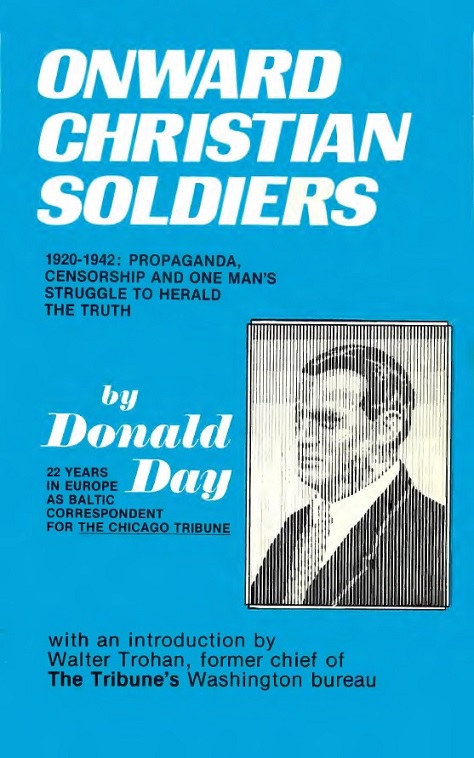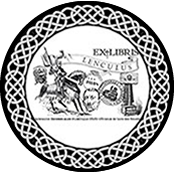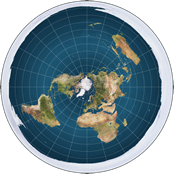
Donald Day - Onward Christian soldiers
1920-1942 : propaganda, censorship and one man's struggle to hearld the truth
22 year in Europe as Baltic correspondent for the Chicago tribune
with an introduction by Walter Trohan, former chief of The Tribune's Washington bureau
Suppressed reports of a 20-year Chicago Tribune correspondent in eastern Europe from 1921
I feel that in fighting the Jewish-Bolshevik regime of Russia that Germany is performing a service for Western civilization which will be properly appreciated and recognized in the future.
Introduction
Truth or myth, which is met more often in our media today? It is difficult, if not impossible, to state definitively. Although both stem from a common root-freedom of the press-the differences vary from honest mistakes to deliberate or unwitting falsifications with the result the end product is more often fiction than information.
Freedom of the press is regarded as the palladium of democracy, vital to the pursuit of happiness, the quest for liberty, the need for justice, the advancement of education and the growth of affluence, with a leavening of fair play for all. Yet, totalitarian powers claim the encouraging watering of a truly free press makes their claimed paradises bloom; although state power no matter how seductively described in the Lorelei songs of a controlled press leads inevitably to ruthless physical power.
It is most difficult at anytime for any reporter to winnow truth from falsehood, wishful thinking, selfish representation and calculated deceit in his eternal search for misfeasance and malfeasance in and out of power politics. Lately, the reading public has been exhibiting more and more distrust of those in control of the arteries of information, so much so that many think freedom of the press may be in danger of death from swallowing its own lies.
Perhaps much of this is due to the fact that too many newsmen today are confident they know the sociological import of a story before they leave the office and do not bother with searching for facts. Or because newsmen are committed to a political direction, so that they believe themselves to be the possessors of a magical touchstone by which they can measure any facts. Or because wherever they may land in a troubled world, they have pre-established in their own minds just who are the good guys and who are the bad guys, so that they become instant experts without concern about mores or motivations. And also because many news gatherers of today delude themselves that it isn't the story so much as the way they write it or mouth it that is important. Many delude themselves that they are writing literature, something like Shakespeare or that they are thundering lines of blank verse something like Sir Henry Irving. Needless to say, they are not.
This conflict between society and the media, which wields massive power over minds without responsibility, is not new. It is an old story and one especially evident in the reporting of news from Soviet Russia from the reporting of the Bolshevik revolution in 1917, through wars hot and cold, to the dark and bloody ground of today.
All this is by way of prelude to Donald Day, a newsman, who was a prophet without honor to many in his own country because he strove to tell the truth when others in his arena of Eastern Europe were myth making. Not only was he without honor in much of his own country, especially the intellectual community, but he was hardly welcome in other lands, influenced by the long propaganda arm of the Kremlin, which had branded him in its black book offoreign correspondents as "highly · unreliable.'' This opinion was shared by many of his reportorial peers in America. I am one of few living men who knew him. He had my respect and admiration when he was working and this has grown since his death. One of his fellow correspondents, Walter Duranty of The New York Times was widely regarded as the sage of Moscow and the most informed man on the Communist experiment, so much so that the National Geographic Society aceepted without question his statement that the Reds had constructed a second railroad line, parallel to the Trans Siberian railroad, and sketched it in on their maps until time proved it a myth. Duranty wrote his own story under the title, I Write As I Please, but some thought it should have been entitled, "I Write To Please The Kremlin Censors." Duranty's book is all but forgotten, while this book of Day's lives again.
Day came from a newspaper family so that the older traditions of the craft were instilled in him from the cradle. He was born in Brooklyn Heights, NY, in 1896, the second of five children, three boys and two girls. His parents were John I. Day and Grace Satterlee, the father being racing editor of the New York Morning Telegraph. The fourth child of this marriage of a Congregationalist father and an Episcopalian mother was the late Dorothy Day, the Catholic convert and activist, who founded the New York newspaper, The Catholic Worker, and St. Joseph's House of Hospitality for the unfortunate. A younger brother, John, was a newsman with the Hearst organization in New York.
The family came west before World War I when the father took an editorship with the long defunct, Chicago lnterocean. Donald and Dorothy attended Robert Waller high school. Dorothy graduated at the age of 16 and won a scholarship to the University of Illinois, where she became a member of the Socialist party and still later, in California, of the Communist party, being one of the pioneers of that movement in this country.
In 1927, a half dozen years after Donald began exposing the chinks in the Communist proletarian program, Dorothy became a convert to Catholicism and began blending the teachings of the man of poverty, St. Francis of Assisi, with the call of Karl Marx to workers to rise and strike off their chains. How much her decision to abandon Communism was due to Donald may never be known. Dorothy's followers who regard her as a candidate for canonization, hold the discovery of the evils of the system was her own and Donald is not here to speak for himself.
On leaving high school, Donald, with the help of his father, became a reporter for the Chicago City News Bureau, a press service financed by the various Chicago newspapers, It is said he joined the staff of The Chicago Tribune to cover labor about the same time as the dashing and flamboyant Floyd Gibbons, one of the more famous correspondents of World War I. About the time America entered the war, Donald had returned to New York, where he served as sporting editor of The Morning Telegraph. He enlisted in naval aviation on Friday 13th, August, 1917, which did not prove an unlucky date for him as he survived two training plane crashes.
After the war he joined The New York World as labor editor. In 1921 he was invited to visit Russia by Ludwig Martens the unofficial Kremlin envoy in this country which then did not have diplomatic relations with Moscow. Martens had been asked to leave this country. Day accompanied Martens and his party to Riga, Latvia, where he sought a visa to Russia as the representative of an American news agency. When the visa failed to arrive the news agency disclaimed Day and stranded him in Riga. Day got in touch with Gibbons then director of The Tribune's European staff and was hired to report from Eastern Europe and to continue his attempt to get a Russian visa which had been promised by Martens but denied by Moscow.
From his Riga listening post, Day sent the fttst stories of the Russian famine. He was tireless in interviewing those fleeing Russia and got the first reports of life in the boasted Red Eden. He was the first to interview Americans who were released from Soviet prisons at the instigation of the American government on the recommendation of Herbert Hoover who headed a relief program which not only saved millions of Russian lives but doubtless saved the Bolshevik regime itself.
In his work Day had some of the glamor of the Richard Harding Davis era of foreign correspondence. He worked with Lithuanian irregulars in the seizure of the Memel territory in 1923. He was there when Estonian Communists undertook their bloody attempt to overthrow the Government. He was the confidant and advisor of many figures in the new governments of his area. For 21 years he was on hand in Latvia, Estonia, Lithuania, Poland and Finland. He covered both Finnish-Russian wars; that for liberation in 1917 and that which was a prelude to World War II. He sent many graphic accounts of warfare in sub-zero weather.
Through 21 years Day sought regularly to get the once promised visa. Almost as regularly he was approached by Red agents, who told him he would get the visa if only he would write favorable articles for some months, and if he would agree to report on the activities of governments with which he was familiar.
This Day would not do. He considered the invitation one to join the Soviet espionage apparatus. His dispatches were giving his readers a picture of life in the new republics, all of which had won independence through bitter and even bloody struggles with Russia. These countries had established themselves, not by grants of aid from the outside but by their own efforts. These countries allowed Day to write without censorship, while in Russia correspondents were required not only to submit to censorship but to report to the foreign office every three months for consideration ofthe extention of their visas. If they displeased the Soviets, their visas were withdrawn. For this reason, The Tribune elected to withdraw George Seldes, its Soviet-ingratiating correspondent from Moscow and leave the coverage of Russia to Day in Riga.
By the test of time Day's dispatches stand out as not only more truthful but more informative than those of his Moscow contemporaries. During his stay in Riga, Day married. Donald's father had attempted to disuade his son from following in his footsteps, warning him he would never get rich in the newpaper trade and advising him to marry a rich widow, since his boy was a handsome and attractive fellow. On his marriage, Day cabled his father: "Dear Dad: Have followed your advice. Have married a widow, but she isn't rich."
Under the shadow of World War ll, Day encountered trouble in Pol~nd for the dispatches he was turning out. Polish newspapers in America complained to PAT, the government owned news agency, that it seldom covered the important stories Day was sending his paper. The nervous government's answer on the eve of war was to bar Day from his annual visits to the country without giving any explanation.
In 1940, just before its takeover, Moscow succeeded in dominating the Latvian government. One of the first acts of the new regime was to order Day out of the country at full cabinet meeting. It was more of an escape than an expulsion for Day, because he was aware that he and his wife might be detained at a moment's notice. They dodged Red tanks and infantry as they made their way to Tilsit, on the German border, along the road Czaritza Catherine built from Riga. They ended up in Finland. When Finland allied itself with Nazi Germany in the summer of 1942, Day moved to Stockholm. In August of that year Michael McDermot, then information officer for the State department, called me in to The Tribune's Washington Bureau to say the department had information from Stockholm that Day was about to defect to Germany and suggested that The Tribune recall Day for consultation to thwart such a move. A visitor's visa was made available to Mrs. Day.
On August 25, 1942 The Tribune cabled Day to return at the earliest possible moment. When no answer was received, several similar messages followed. Subsequently I learned from Day that he had no intention then of defecting to Germany but felt subjected to harrassment by the department. On September 1, he wired from Helsinki asking for leave without pay or that he be placed on pension, saying he had applied to enlist in the Finnish army.
Evidently in cooperation with the American embassy in Stockholm, the Swedish government notified Day his passport had lapsed. He was then a man without a country as far as the United States was concerned. He did tum up in Germany a year later, where he became a commentator on the Nazi propaganda radio, but he confined himself to praising Finnish athletes and lauding the bravery of Finn troops in their war with Russia. At the end of the war, when the Justice department examined Day's scripts, no treason could be found, such as marked the broadcasts of Americans who aligned themselves with Nazis in Germany and Fascists in Italy. While he was in Germany, Day continued his self-declared war against Communism even under American detention. He was released by the American government after careful combing of his broadcasts revealed no taint of treason. Day returned to Finland with his wife.
Two years before his death in Helsinki, September 30, 1966, of a heart attack, Day called my attention to a story he had uncovered in a German counter-intelligence camp.
He was given the story by Andreas Hofer, former Nazi gauleiter for southern Tyrol. Hofer was a direct decendant of the Austrian peasant leader of the same name, who led the abortive Tyrolean revolt against the French under Napoleon in 1810 and was executed. In 1943 Andreas told Day he saw that Germany could not win the war and concluded that the only thing that could save Germany and Europe from the Communist menace was a negotiated peace. He suggested the German general staff concentrate all western war prisoners in some valleys of upper Bavaria, which would have deterred allied bombardment of that region. The area was to be strongly fortified, under the plan, and held as a last ditch defense to force a negotiated peace.
The German high command rejected the plan at the time it was put forward, but in 1944 Hofer was called upon to prepare the plan, which he did. Somewhere along the line, Hofer reported, his plan was turned over to a Russian spy, and the Russian high command altered the plan to make it appear that the Bavarian fortress was already completed, which alteration deceived military leaders in Washington and London when the Russians turned it over. Hofer was induced to tell his story to Rodney C. Minott, an American historian, who wrote a book on the information, entitled: Tlte Fortress That Never Was.
"Gen. George Patton, whose reconnaisance planes had repeatedly scanned the area without dscovering any signs of fortification," Hofer said, "knew the American general staff had been deceived. He thought the next best thing to capturing Berlin would be to take Prague. He pressed on through upper Bavaria and reached the suburbs of Prague before he was ordered to halt his advance and retire to upper Bavaria. "This clever use of espionage by the Russians enabled them to divert the most powerful striking force of the American invasion army on a false tangent, enabling the Russians to reach Berlin first. This resulted in the loss of Czechoslovakia, the division of Austria and Germany, and the creation of an isolated Berlin.''
At the time of Day's last sreat scoop, I endeavored to interest a Tribune editor into taking Day back, at least as a stringer, as I was advised by mutual Finnish friends that he had fallen upon hard times. This effort failed, to my lasting sorrow, partly because the editor was preoccupied with his own great man image and partly because I was not persuasive enough. I could not sell my belief that The Tribune owed a measure of justice to a sreat reporter and a fine man. So, at this late date, I am privileged to light this candle to his memory.
Walter Trohan
Columbia, Maryland
October 30, 1981
For more informations



